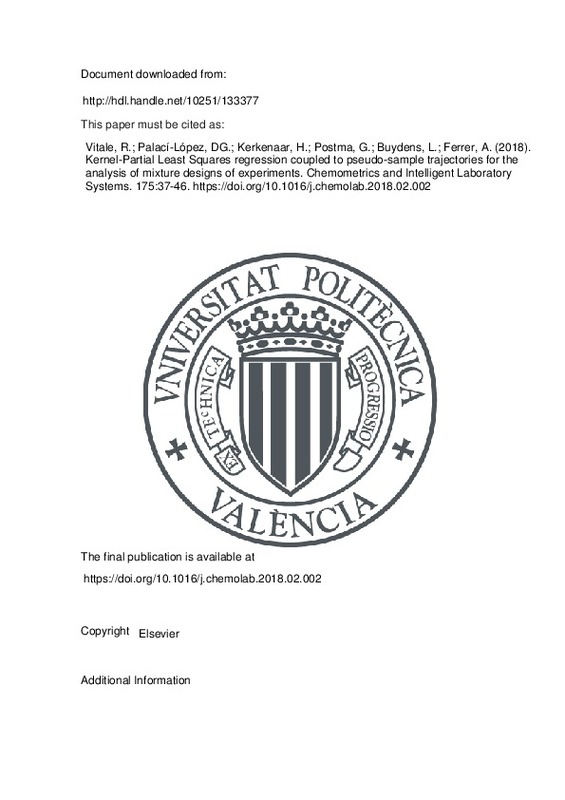JavaScript is disabled for your browser. Some features of this site may not work without it.
Buscar en RiuNet
Listar
Mi cuenta
Estadísticas
Ayuda RiuNet
Admin. UPV
Kernel-Partial Least Squares regression coupled to pseudo-sample trajectories for the analysis of mixture designs of experiments
Mostrar el registro sencillo del ítem
Ficheros en el ítem
| dc.contributor.author | Vitale, Raffaele
|
es_ES |
| dc.contributor.author | Palací-López, Daniel Gonzalo
|
es_ES |
| dc.contributor.author | Kerkenaar, Harmen
|
es_ES |
| dc.contributor.author | Postma, GJ
|
es_ES |
| dc.contributor.author | Buydens, Lutgarde
|
es_ES |
| dc.contributor.author | Ferrer, Alberto
|
es_ES |
| dc.date.accessioned | 2019-12-19T21:02:12Z | |
| dc.date.available | 2019-12-19T21:02:12Z | |
| dc.date.issued | 2018 | es_ES |
| dc.identifier.issn | 0169-7439 | es_ES |
| dc.identifier.uri | http://hdl.handle.net/10251/133377 | |
| dc.description.abstract | [EN] This article explores the potential of Kernel-Partial Least Squares (K-PLS) regression for the analysis of data proceeding from mixture designs of experiments. Gower's idea of pseudo-sample trajectories is exploited for interpretation purposes. The results show that, when the datasets under study are affected by severe nonlinearities and comprise few observations, the proposed approach can represent a feasible lternative to classical methodologies (i.e. Scheffe polynomial fitting by means of Ordinary Least Squares - OLS - and Cox polynomial fitting by means of Partial Least Squares - PLS). Furthermore, a way of recovering the parameters of a Scheffe model (provided that it holds and has the same complexity as the K-PLS one) from the trend of the aforementioned pseudo-sample trajectories is illustrated via a simulated case-study. | es_ES |
| dc.description.sponsorship | This research work was partially supported by the Spanish Ministry of Economy and Competitiveness under the project DPI2014-55276-C5-1R and Shell Global Solutions International B.V. (Amsterdam, The Netherlands). | es_ES |
| dc.language | Inglés | es_ES |
| dc.publisher | Elsevier | es_ES |
| dc.relation.ispartof | Chemometrics and Intelligent Laboratory Systems | es_ES |
| dc.rights | Reserva de todos los derechos | es_ES |
| dc.subject | Mixture designs of experiments | es_ES |
| dc.subject | Kernel-Partial Least Squares (K-PLS) | es_ES |
| dc.subject | Pseudo-sample trajectories | es_ES |
| dc.subject | Scheffe and Cox polynomials | es_ES |
| dc.subject | Partial Least Squares (PLS) | es_ES |
| dc.subject | Ordinary Least Squares (OLS) | es_ES |
| dc.subject.classification | ESTADISTICA E INVESTIGACION OPERATIVA | es_ES |
| dc.title | Kernel-Partial Least Squares regression coupled to pseudo-sample trajectories for the analysis of mixture designs of experiments | es_ES |
| dc.type | Artículo | es_ES |
| dc.identifier.doi | 10.1016/j.chemolab.2018.02.002 | es_ES |
| dc.relation.projectID | info:eu-repo/grantAgreement/MINECO//DPI2014-55276-C5-1-R/ES/BIOLOGIA SINTETICA PARA LA MEJORA EN BIOPRODUCCION: DISEÑO, OPTIMIZACION, MONITORIZACION Y CONTROL/ | es_ES |
| dc.rights.accessRights | Abierto | es_ES |
| dc.contributor.affiliation | Universitat Politècnica de València. Departamento de Estadística e Investigación Operativa Aplicadas y Calidad - Departament d'Estadística i Investigació Operativa Aplicades i Qualitat | es_ES |
| dc.description.bibliographicCitation | Vitale, R.; Palací-López, DG.; Kerkenaar, H.; Postma, G.; Buydens, L.; Ferrer, A. (2018). Kernel-Partial Least Squares regression coupled to pseudo-sample trajectories for the analysis of mixture designs of experiments. Chemometrics and Intelligent Laboratory Systems. 175:37-46. https://doi.org/10.1016/j.chemolab.2018.02.002 | es_ES |
| dc.description.accrualMethod | S | es_ES |
| dc.relation.publisherversion | https://doi.org/10.1016/j.chemolab.2018.02.002 | es_ES |
| dc.description.upvformatpinicio | 37 | es_ES |
| dc.description.upvformatpfin | 46 | es_ES |
| dc.type.version | info:eu-repo/semantics/publishedVersion | es_ES |
| dc.description.volume | 175 | es_ES |
| dc.relation.pasarela | S\362405 | es_ES |
| dc.contributor.funder | Shell Global Solutions International B.V. | es_ES |
| dc.contributor.funder | Ministerio de Economía, Industria y Competitividad | es_ES |







![[Cerrado]](/themes/UPV/images/candado.png)

